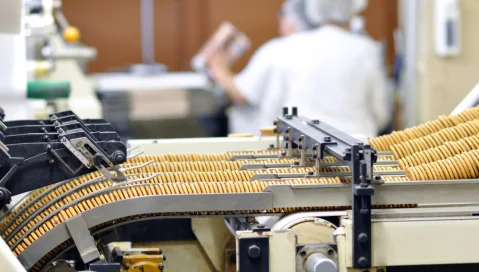Food Recalls and Traceability: Identifying Their Importance in Food Safety and Leveraging ERP Solutions for Improvement
Food Recalls and Traceability: Identifying Their Importance in Food Safety and Leveraging ERP Solutions for Improvement
Food Recalls and Traceability: Identifying Their Importance in Food Safety and Leveraging ERP Solutions for Improvement
26 Aug 2021
Jack Payne
In this era of increasing food safety demands from consumers and regulatory bodies, no business wants to be faced with the prospect of recalling a product. Besides the potential damage to a brand’s reputation, food and beverage product recalls also have substantial negative consequences for companies’ bottom lines, with the average cost coming in at $10 million.
Most food safety emergencies result from errors in processing and handling. But thankfully, the technologies are available to help prevent these issues. The best among them—food and beverage industry-specific enterprise resource planning (ERP) solutions—ensure total traceability of your raw materials and also make the process of issuing and executing a recall much easier and faster.
Later in this blog we’ll explore the advanced systems that protect top food and beverage organizations and their customers from food safety threats. But first, let’s examine what’s required of businesses like yours in terms of traceability and how to avoid mistakes that can result in a recall.
The Necessity of Total Traceability
One of the most important reasons to track and trace your materials and finished products through their entire journey along the supply chain is that it’s required by law. In the U.S., the Food Safety Modernization Act of 2011 created some of the first standards regarding traceability, and now the Food and Drug Administration has proposed a new rule under Section 204 that will establish more stringent requirements for businesses dealing with high-risk ingredients.
Meanwhile in Europe, the European Commission’s General Food Law Regulation specifies food and beverage organization’s responsibilities on the traceability front, and in the UK, the Food Standards Agency does the same with Article 18 of their General Food Law. Across the board, the message is clear: food and beverage businesses must be accountable when it comes to the safety of their products.
Why, though, is traceability so important when it comes to preventing food safety issues and executing product recalls when incidents do occur? Without knowing what materials have been where, you can’t know what they may have come into contact with. You won’t be able to judge what was at risk for contamination, nor will you be able to find the source of the contamination should it be identified in your facilities or further downstream.
If your company works with any ingredients with allergen concerns, the need for full food traceability is even more obvious. Considering undeclared allergens continue to be the leading cause of food safety emergencies and recalls, having these items in your facility necessitates greater vigilance on the part of your staff and systems to ensure that consumers who are at risk can be confident that what they buy is safe to consume.
Assured Recall Preparedness
While it is best to avoid food safety problems with excellent tracing and sanitation procedures that limit opportunities for contamination, expecting perfection in complex food and beverage manufacturing and distributing operations is unrealistic. Recalls are a part of the industry, but the 363 that occurred in the U.S. alone in 2020 show that there is definitely room for improvement.
A critical step for your business to take—if it hasn’t already—is to outline a plan in case a recall is deemed necessary for one of your products. The following steps should be included in your objectives:
Alert and activate your organization’s traceability and recall team and record the case.
Assess the risk and determine the severity and extent of the contamination.
Issue key communications, including those to the FDA.
Place an immediate hold on the affected products and trace the contamination to its source.
Establish the scope of the recall and initiate the process.
Complete and file all necessary paperwork once the products have been withdrawn.
While most regulatory agencies recognize that setting timeframe requirements for recalls is impractical, as the extent of the efforts necessary and the number of affected products and businesses could be considerable, many food and beverage companies set their own benchmarks for turning around withdrawals. This approach may or may not suit your circumstances, but establishing high standards and sticking to them can be a good motivational tool when time is of the essence.
Putting Technological Tools to Good Use
Accomplishing all of the recommended measures laid out here and adhering to the best food safety practices at all times can be daunting—especially for large food and beverage enterprises with many facilities in different parts of the world. Frankly, even the most well-trained and diligent teams would likely be unable to cover it all, but that’s where ERP solutions come in.
ERP for food and beverage businesses facilitate excellent traceability with automatic data capture all along the supply chain and real-time updates to all material and product information. These platforms integrate with suppliers as well as partners further down the supply chain, syncing facts and figures from site to site and process to process so that key details are always recorded.
The best among these systems—like our industry-specific food and beverage solution, Aptean Food & Beverage ERP—connect with smart sensors, scales, barcode and QR code scanners and RFID tags to make sure readings are taken at all critical points and ingredients can be tracked by lot, item number, shipment or any other configurable unit. After all, that’s the level of detail your organization will need to be truly ready in the event of a recall.
Speaking of, food ERP can also automate parts of the recall process, including issuing the required communications to vital parties and flagging affected products in the database. What’s more, the data the solutions collect regarding sourcing, storage and processing of materials facilitates locating the origin of the contamination.
Additionally, advanced food ERP platforms can use blockchain technology to securely maintain traceability data, further bolstering your company’s efforts to establish airtight tracking capabilities. They also offer cloud deployments and 24/7 remote access to your information and interfaces, making acting with agility and confidence much more doable.
Holistic Food Safety Improvement with ERP
It should be clear by now how incredibly powerful ERP solutions can be in improving your food recall and traceability practices. By taking the guesswork and room for human error out of the equation when it comes to capturing ingredient and product information and automating many key processes, these systems allow your operations to move nimbly and with confidence.
But that doesn’t cover the full list of benefits of food and beverage industry-specific ERP, as the single, unified database that links everything from finance to recipe management is a game-changer in terms of modernizing and transforming companies into fully digital operations. They are also configurable to a wide variety of compliance regulations, affording you peace of mind when it comes to audits and meeting stringent requirements.
With a purpose-built platform, food and beverage businesses like yours can simply do more, and with greater accuracy and efficiency, than ever before. If you want to hear more about Aptean's food ERP and how it can support your food safety initiatives, contact us today.
Erfolge von Aptean ERP-Kunden
Diese 10 Kunden aus verschiedenen Lebensmittel- und Getränkesektoren haben mit unserer Lösung mehr erreicht.



